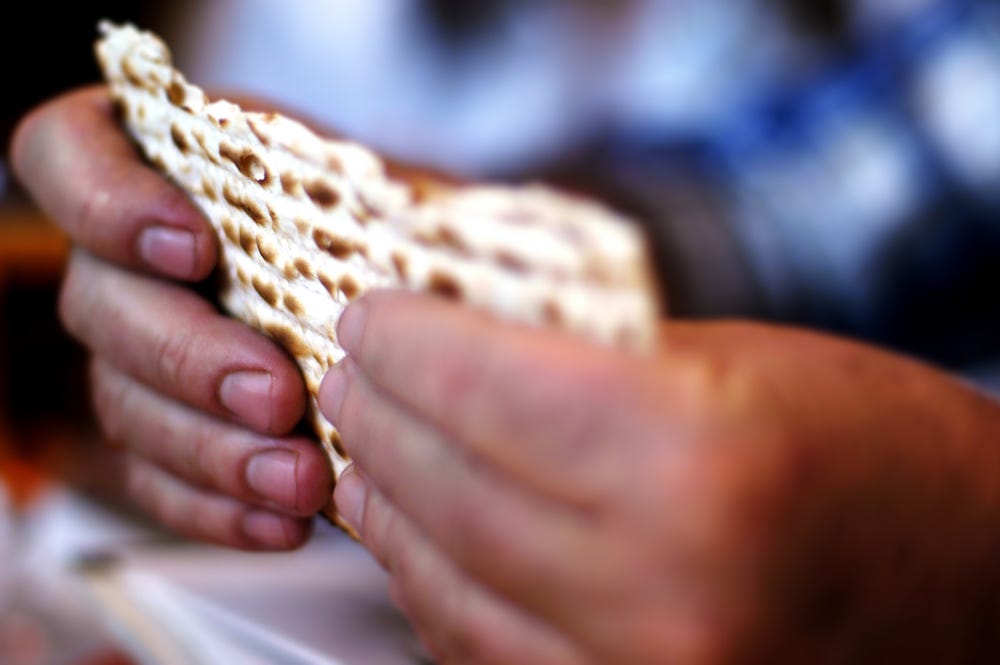This Passover, Freedom Feels More Precious
Troubling events of the past year remind us not to take democracy for granted.
Broken and united: At the seder, the middle matzah is divided, a piece is hidden, then found and eaten at evening’s end.
My maternal Bubbe used to say that Jewish mazal was when you lost a valuable object … and then you found it. (It sounds better in Yiddish.)
The point is that too often we don’t appreciate things until we don’t have them anymore.
I can’t help thinking that as we approach Pesach 5783 and look back over the past year – as Putin’s vicious war on Ukraine drags on, and American and Israeli personal freedoms are no longer a given – democracy is under threat around the world.
Passover this year comes as both a warning and a symbol of hope.
One of the most powerful elements of the seder, and the reason why it has been observed for thousands of years, is that we don’t just recall the story of the Israelites’ transformation from slavery in Egypt to freedom to serve God. We experience it.
We taste the bitter herbs of oppression and celebrate the wine of liberation because we are reminded each year that it is as if we ourselves were brought out of Egypt on the road to redemption.
But I can’t help feeling that this Passover, as the Jewish nation finds itself in the midst of a cataclysmic clash of values, principles and ideals, we may be witnessing the Biblical Exodus in reverse: from full, vibrant democracy toward a future of deeply diminished freedom, away from Jewish ideals and the vision of the State’s founders.
At the outset of the seder, we read: “This year we are slaves; next year we shall be free.” In a very real sense, though, vast numbers of Israelis have been demonstrating for three months because they fear that the freedom they are expressing so powerfully through their protests is in danger. If the judicial overhaul takes place as the coalition leaders insist it will, next Passover could find an Israel whose citizens’ rights have been curtailed, leading to another kind of exodus — of a wide range of disillusioned Zionists away from the Holy Land.
I pray that won’t come to pass and that rational heads will prevail in the coming weeks, chastened by the very real threat of a civil war if they don’t put country – and Jewish values – over personal and political goals. But that’s certainly not a given.
The Haggadah calls on us to remember our past, be grateful for our present and look with hope to the future. It describes the humble beginnings of a tribe that has survived for thousands of years and it relates the miracles that propelled us into a People with a mandate to be “a light unto the nations.”
But such a noble calling begins at home.
Passover comes at the perfect moment this week as Israelis who have been demonstrating and counter-demonstrating against each other pause to celebrate the same holiday and read the same uplifting story told in the Haggadah. They are encouraged to share a festive meal with family and friends and to discuss, argue, ask questions, tell stories, pray and sing together and, most importantly, engage the next generation in a tradition that goes back to the days of Moses.
Perhaps these powerful seder experiences, a rediscovery and celebration of our common heritage at a time when political rift emphasizes our differences, can lead Israelis and Jews everywhere back from the abyss to a renewed sense of cooperation and compromise, if not unity.
We can take comfort in the symbolic message of the afikomen.
At the beginning of the seder we break the middle matzah to mark how fractured our world is, still enduring slavery and oppression in the 21st century. Part of the middle matzah is hidden, and the seder is not complete until that piece, the afikomen, is found and eaten – a symbol that if we search hard enough, we can make whole again what is broken.
So enough of threats and recriminations: “Dayenu!”
We pray for “Next year in Jerusalem” – in freedom and solidarity.
Chag sameach.





Great piece and chag sameach.
Chag Sameach